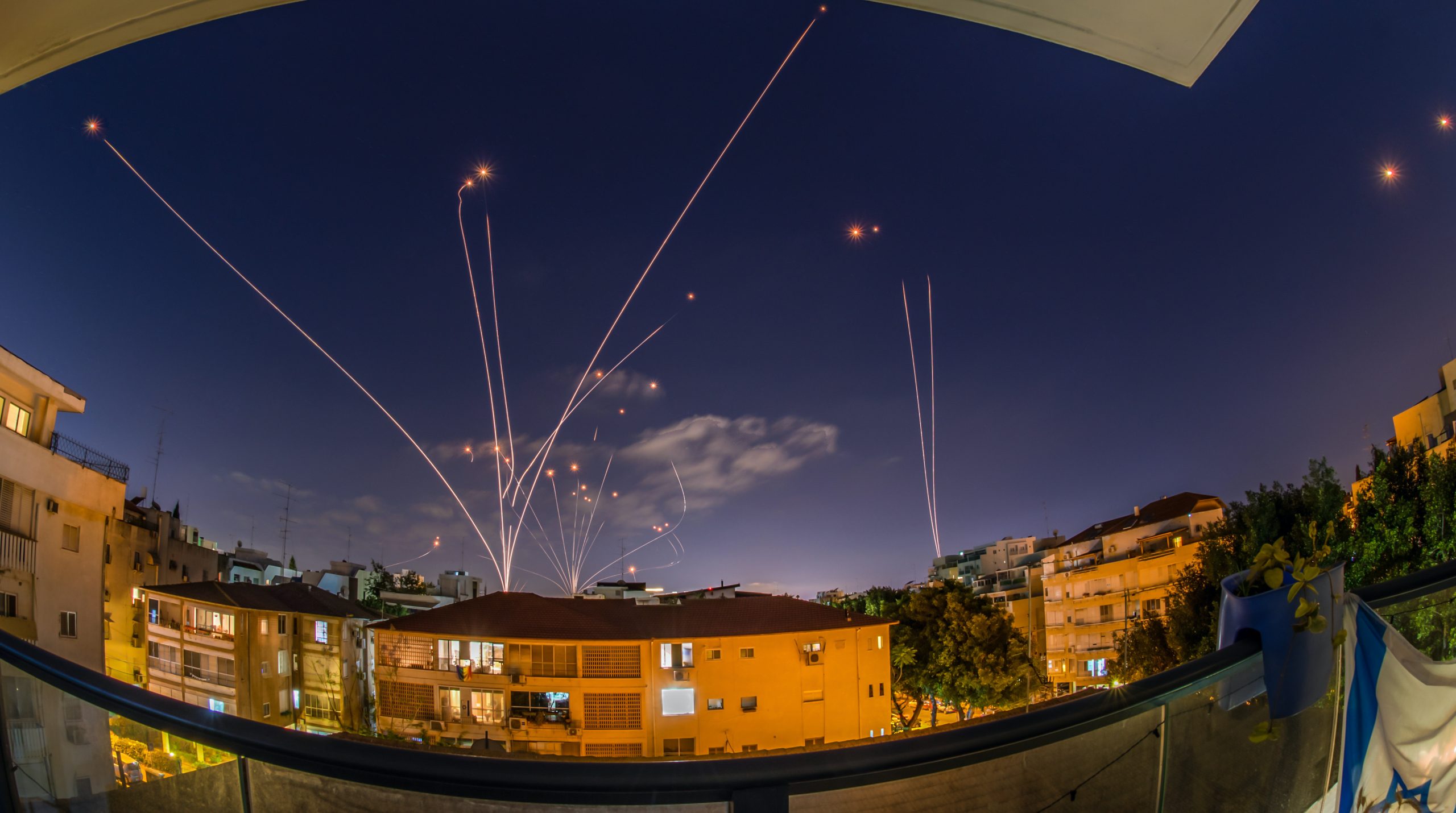How you can pray for the Israel-Palestine conflict
In May, a horrified world watched as Israel and Palestine erupted in bloodshed, air strikes, violence and death. Salt&Light takes you on an inside look into the conflict in this 2-part series.
by Tan Huey Ying // June 12, 2021, 1:35 am

Rockets in a night attack on May 2021. Photo by Oren Ravid on Shutterstock.
“Pray for the peace of Jerusalem.” (Psalm 122:6)
This is a verse that has been making its rounds in Christian circles in Singapore amidst the latest flare-up between the state of Israel and Palestinians this year.
The sequence of events leading up to this round of violence started in early May over the decision to evict several Palestinian families in the Sheikh Jarrah neighbourhood. As the violent protests grew, there was a clash between Palestinian worshippers and Israeli police at the Al-Aqsa Mosque in Jerusalem.
The mosque is located within a compound in the Old City of Jerusalem, known as the Noble Sanctuary (al-Haram al-Sharif) by Muslims or as the Temple Mount by Jews and Christians.
As the holiest site for Jews and the third holiest for Muslims, it is hotly contested by both Israel and the Palestinians.
The 11-day conflict saw thousands of rockets fired and over 200 civilian casualties, the most intense fighting since 2014.
Hamas, the Palestinian militant group, responded by issuing an ultimatum, demanding Israel’s withdrawal from Sheik Jarrah and the al-Aqsa Mosque. When that did not happen, Hamas started firing rockets into Jerusalem, triggering waves of retaliatory Israeli airstrikes.
With widespread media coverage, there was a blitz of conflicting narratives which has now quietened down soon after the May 20 ceasefire.
It marked the end of an 11-day conflict with thousands of rockets fired and over 200 civilian casualties, the most intense fighting since 2014.
The ceasefire is holding – for now – but international observers around the world are warning of heightened tensions again as Israel goes to the polls today (Sunday, June 13).
It is a conflict that has stretched on for millennia – since Biblical times.
Differentiating between Biblical vs modern-day Israel
One term that requires a clear definition is “Israel”. There are three critical differences between the Israel of the Bible and the State of Israel that exists today:
1. Religious nation vs Secular state
The nation of Israel in the Bible was a monarchy and of only 2 million Jews, the majority of whom were religious.
In contrast, modern Israel is a state that is a democracy with a government (the Knesset) and Constitution. Although the Jewish identity is acknowledged and emphasised, it is a state formed by a United Nations vote in 1947 and the majority of its 7 million citizens are secular.
2. Singular ethnic people group vs Diverse citizenship
Biblical Israel was a homogenous ethnic group of Jews divided only by tribes, who were known as Israelites. It was formed from the family of one man; Jacob, grandson of Abraham and son of Isaac, whom God renamed Israel and made him father of the 12 tribes.
However, in the state of Israel today, non-Jewish Israelis make up close to 25% of the population. These include the Arabs, such as the Palestinians, and other minority ethnic groups who have immigrated to Israel.
In addition, more than a quarter of Jews and people of Jewish descent, are immigrants from America, Europe, Africa and Asia.
3. Communication with God
The Israel of old had direct communication with God through their leaders – judges, prophets and kings – and priests from the tribe of Levi. Even in their straying, they relied on God and were known as His.
Modern Israel, however, is a state that relies on its technological and military prowess and has no official acknowledgement of God.
Prayer leads the way
There is no humanly-conceivable solution to the conflict in sight – not when the ideational differences between the Israelis and Palestinians are so pronounced.
The only solution: Pray.
The cultural hatred is deeply enmeshed and has been perpetuated on both sides for generations, even among children in kindergartens.
Some political observers would even argue that the lack of peace in the land is beneficial to the political groups leading both sides, meaning there is little political motivation on either side to seek a lasting peace.
Add to this the complication of the Israel-Palestinian conflict being only a small part of the wider Arab-Jewish hostilities between Israel, the Palestinians and other countries in the region.
The only solution: Pray.
How can you pray for the Israel-Palestine situation?
1. For the leaders in the region
The last major conflict was in 2014. It lasted seven weeks and saw over 2,000 deaths.
Between now and the next inevitable flare-up – which history suggests will happen once the rockets are replenished – you can pray for:
- Wise leaders in Israel, Palestine and in the region.
- That decisions will be made with the intention to heal, not create, divisions; to protect lives of people on both sides instead of exploiting them for power plays.
- For decisions that will prevent further radicalisation of extremists who incite and engage in violence.
2. For Christians in Israel
Israeli Christians make up a mere 1.9% of Israel’s 7 million population, and are mostly ethnically Arabs.
Messianic Jews (Jewish Christians) face both persecution by ultra-Orthodox Jews and derision by secular Israelis, who identify as Jewish out of a national and traditional identity.
If there were a demonstrable love between the Jewish and Arab Christians in Israel, it would be a testimony of the “one new man” in Christ (Ephesians 2:15) between irreconcilable enemies.
You can pray:
- For the testimony of Israeli Christians – that the Jewish-Arab bonds in Christ will be a strong testimony throughout the region.
- That any negativity in this secular nation towards Christians will be proven wrong.
3. For the Gospel to be made known to all
Israelis are mostly Jewish while the Palestinians are largely Muslim. While their specific views may vary, neither recognises that Jesus Christ is the Messiah.
Pray that the Gospel will be made known, and that more will come to acknowledge Jesus Christ as Lord and Saviour.
READ PART I OF THE ISRAEL-PALESTINE SERIES HERE:
We are an independent, non-profit organisation that relies on the generosity of our readers, such as yourself, to continue serving the kingdom. Every dollar donated goes directly back into our editorial coverage.
Would you consider partnering with us in our kingdom work by supporting us financially, either as a one-off donation, or a recurring pledge?
Support Salt&Light


